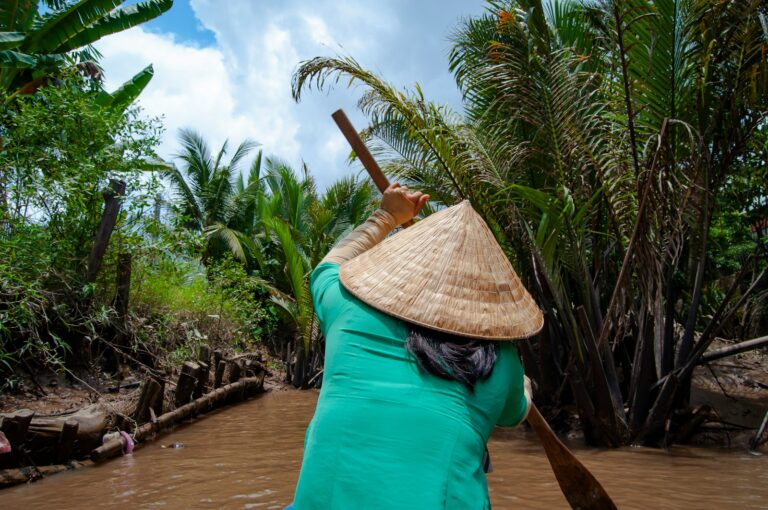Ladyboy in Bangkok
The first thing I noticed was her effortless grace. Walking into my Bangkok hotel, I met a receptionist with beautiful chestnut hair, a perfectly shaped nose, rosy cheeks, and a warm, confident smile. She moved with elegance. Then she spoke. That voice – slightly deeper than you’d expect – instantly revealed what her flawless appearance might have hidden: she was a “ladyboy.”
Thailand looks at transgender people with far less judgment than many other places in Asia. Here, transgender women, often called “ladyboys” or “kathoey,” who’ve transitioned from male to female, don’t just live openly; many become famous entertainers. The most famous is probably Nong Poy – an actress, singer, model, and TV host – often called one of the world’s most beautiful transgender women. But behind the glamour in her photos, the road to acceptance for transgender people in Thailand and across Asia is full of huge challenges.
Life Between Acceptance and Recognition
While countries like Canada, Spain, the US, and others in the West have moved toward allowing same-sex marriage and protecting LGBTQ+ rights, it’s a very different story in much of Asia. Thailand stands out as a place of relative tolerance, where being transgender doesn’t automatically mean facing harsh rejection. But this acceptance hasn’t turned into real legal equality.
Consider Jim Sara, Thailand’s first well-known male-to-female transgender person. She married her partner in 1998, but it took eight years and moving to New Zealand for their marriage to be legally recognized. Crucially, Thai law still forbids changing the gender marker on official documents. This causes big problems every day. Imagine the stress of traveling abroad when your passport photo and listed gender don’t match who you are. Transgender Thais have to carry medical papers proving their transition just to get through passport control – a constant, painful reminder that the government won’t acknowledge their true identity.
This legal gray area hurts people in neighboring countries too. Cindy Thái Tài, a pioneering transgender woman from Vietnam, faced a shocking situation when she flew home after surgery in Thailand. Officials at Tân Sơn Nhất Airport denied her entry because she looked completely different from the male photo in her passport. She was stuck. She had to desperately ask the Vietnamese Embassy in Bangkok for help, showing documents about her surgery, before she was finally allowed back into her own country. Vietnam, like many nations, still has no real laws dealing with the rights and recognition of LGBTQ+ people.
Stages for Survival and Shining
Even with the legal hurdles, Thailand has spaces where transgender talent shines brightly. Many build successful careers in the dazzling world of cabaret shows. Places like the world-famous Tiffany’s Show in Pattaya, Mambo Cabaret in Bangkok, and Simon Cabaret in Phuket feature transgender dancers and performers who wow audiences night after night. These artists are beautiful and graceful, performing complex routines from Russian folk dances to K-Pop, Japanese acts, Chinese spectacles, and Vietnamese songs with amazing skill and total professionalism.
Tiffany’s also holds the yearly “Miss Tiffany’s Universe” pageant, a big event that crowns transgender beauty queens. These winners often become stars in the cabaret world and major draws for tourists wanting photos. You might hear a playful “150 baht, please” for a picture, but bargaining is normal, and prices can drop as low as 30 baht (about 80 cents) late at night. While this is part of the business, it shouldn’t take away from the real artistry and hard work these performers put into their shows.
The Painful Price of Becoming Yourself
The journey to align your body with your identity is incredibly tough, painful, and risky. Thailand has become a global center for gender confirmation surgery (GCS), mainly because it’s more affordable. As Nguyễn Thị Duyên, a long-time Bangkok tour guide, says, “Thailand is seen as a ‘surgical paradise’ for transition.” Costs here (20,000-30,000 USD) are much lower than in Europe or the US (often over 50,000), attracting people from all over the world seeking the body they know is right for them.
But the process is far from simple or easy. While the major surgery usually waits until age 18 (or 20 without needing parents’ permission), many transgender women start taking feminizing hormones much younger, often as teenagers. This helps develop softer features, change body shape, and slightly raise their voice pitch. Starting young means dealing with complicated social and sometimes family issues. Even at 18, it’s not straightforward. Thai law requires a three-month “thinking period” with a psychologist who actively tries to talk them out of surgery, pushing society’s norms. Only if they stick to their decision after this can they sign the papers.
The physical changes are grueling. Getting a convincingly feminine shape, especially for those who start hormones later, often needs more than just hormones. Procedures like laser bone contouring (shaving down jawlines or brows) help create a softer bone structure. Changing the voice remains a big challenge; hormones don’t alter vocal cords developed during male puberty, so many are left with voices that don’t feel like their own.
The actual GCS is a major, painful operation, sometimes described as involving dozens of steps over many hours. But the medical journey doesn’t stop there. To keep their feminine appearance and stop masculine traits from returning, they need hormone therapy for life. Stopping means facial and body hair growing back, muscles getting bigger, and body fat shifting back – a never-ending, expensive battle fought with injections, patches, or pills. Many also spend a lot on skin lighteners, hair treatments, and vitamins, putting more strain on their health and wallets.
The toll on the body is heavy. Duyên points out the ultimate cost: life expectancy. “Normal life expectancy might be 70,” she notes, “but transgender women often don’t live past 50.” The mix of hormones and chemicals leads to constant tiredness, weakness, and higher risks of serious illnesses like cancer. Some look much older by their 20s. Surgery just for facial feminization can add another 10,000 USD, while GCS, because it’s so complex, can cost 40,000 USD.
Love, Partners, and Searching for Normal Life
Within Thai society, transgender women often have long-term partners they call “husbands.” But these relationships have no legal status. Money often plays a role; the huge ongoing costs of maintaining their looks and health after surgery mean many transgender women look for partners who can provide financial security. It’s common to see luxury cars like Mercedes or Audi waiting outside Tiffany’s in Pattaya late at night, picking up performers after the last show – a sign of this practical side of their lives.
“It’s Not an Illness”: The World Slowly Understands
The main fight for transgender people everywhere is the basic need to live honestly and be treated with respect. Views are changing, but unevenly. As the former Prime Minister of Spain, Mariano Rajoy, said when Spain passed its landmark LGBTQ+ protection law back in 2012: “They are our friends, our neighbors, our family members… the hairdresser on the corner, your childhood playmate… they are anyone.” This simple statement changes the whole conversation: transgender people are just part of life.
Malaysian LGBTQ+ rights expert Honey Tan notes that even the most accepting countries today held deep prejudices in the past. The US, for example, once wrongly labeled homosexuality a disease and tried useless “cures.” Eventually, lawmakers understood sexual orientation couldn’t be changed, leading to marriage equality, now legal across the US. President Obama’s strong support, including backing same-sex marriage and writing a personal letter to a girl with two dads, marked big shifts.
Globally, former UN leader Ban Ki-Moon gave a powerful speech in 2012: “To lesbian, gay, bisexual, and transgender people… you are not alone. Your fight to end violence and unfair treatment is everyone’s fight.” This call for basic human rights shows the worldwide nature of the struggle for simple dignity.
The Victory of Living Your Truth
Maybe nothing shows the heart of this struggle better than the tears of Phạm Lê Quỳnh Trâm in Vietnam. She wasn’t crying from sadness, but from huge relief and happiness. She became the first person in Vietnam to legally change her gender marker from male to female. “From now on,” she said, filled with joy, “I can finally live as my true self.”
Quỳnh Trâm’s story shows the incredible strength needed. She didn’t just face society’s walls; she excelled in school, graduating from two tough universities at the same time – the University of Economics and the Banking Academy in Ho Chi Minh City. Coming from a poor family, she paid for her transition through sheer willpower, tutoring students all over the city to earn the money for her surgeries. Her story is about deep courage, intelligence, and an unbreakable drive to be herself.
The ladyboy receptionist in Bangkok, the stunning stars of Tiffany’s, Jim Sara, Cindy Thái Tài, and Quỳnh Trâm – their stories, though different, all point to the same simple, human need: to be seen, known, and respected for who you truly are. Their lives, lived against huge legal, medical, and social challenges, prove their courage and shout out for more understanding and acceptance everywhere. That first surprise at hearing a deeper voice? It quickly fades, revealing a complex, tough, and deeply human reality underneath.




